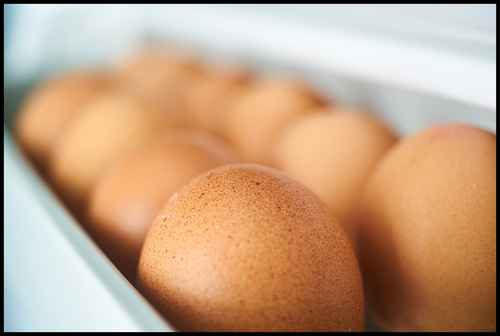How Long Does Hard Boil Eggs Last In The Fridge?
 When eggs are about to go bad, some people think that cooking them is a good solution to extend their shelf life. And to the point that they leave the cooked eggs in the refrigerator and eat them more than a week later without fearing that they will cause them any harm. But the truth is that, even if they are very well cooked, their consumption in these circumstances is not without risk. Perhaps you’re wondering, how long does hard boil eggs last in the fridge? How long should i boil eggs so they last longer? Read on to find the answers to these questions.
When eggs are about to go bad, some people think that cooking them is a good solution to extend their shelf life. And to the point that they leave the cooked eggs in the refrigerator and eat them more than a week later without fearing that they will cause them any harm. But the truth is that, even if they are very well cooked, their consumption in these circumstances is not without risk. Perhaps you’re wondering, how long does hard boil eggs last in the fridge? How long should i boil eggs so they last longer? Read on to find the answers to these questions.
Contents
How long does hard boil eggs last in the fridge?
To determine how long hard-boiled eggs can be kept in the fridge, you must take into account some considerations. Do they still have the shell or did you peel them to consume them comfortably when the time comes? If it is the first case, they can be kept refrigerated for a week without any risk to consume them. The shell protects them from pathogens, and since they are fully cooked, it is more difficult for them to spoil. However, this recommendation would not apply to undercooked eggs, such as soft-boiled eggs.
If you have removed the shell and even kept them in a container in the refrigerator, they will not still last so many days. In fact, if you want to do it right, it is best to eat them the same day you peel them.
What is the difference between a hard boil and a soft boil egg?
What determines whether a boiled egg is hard-boiled or soft-boiled is the cooking time taken to boil the eggs. The process of cooking both eggs starts essentially the same way. First make sure your eggs are fresh and at room temperature. Then, boil enough water in a pot to cover entirely the eggs you want to cook. When the water starts boiling, submerge your eggs and start tracking the time.
- For soft-boiled eggs, leave them in the boiling water for 3-4 minutes.
- For Mollet eggs, leave them in the water for 5-7 minutes.
- Lastly, for hard-boiled eggs, leave them in the water during 10-12 minutes.
After cooking your eggs for the desired time, take them to a bowl prepared with cold water (placing ice cubes in the water should do the trick) to stop the cooking process.
In addition, there are other points to take note regarding the preservation and consumption of hard-boiled eggs that are worth knowing. The first thing to know is that, like the rest of cooked foods, hard boil eggs should not remain at room temperature longer than necessary. Thus, once you have cooked the eggs, you should store them in the refrigerator for a maximum of two hours afterward; and, as previously mentioned, best with the shell on. Only take them out of the refrigerator when you are going to consume them, do not do it in advance.
Can I reheat my hard boil eggs stored in the fridge?
If you want to consume them hot, you can remove them from the refrigerator and heat them with the shell in a pot with hot water. Then peel them and serve them on the plate for immediate consumption. Do not do this in the microwave, as steam may build up inside the shell and cause the egg to explode. Heat only the ones you need, as it is not advisable to re-save leftovers.
How long do hard boil eggs last outside?
What if I want to take them in a salad to enjoy at a picnic? To begin with, a salad may not be the best choice for eating outdoors, especially if it is going to be hot and you are going to carry it around in your backpack. High temperatures facilitate the proliferation of microorganisms, especially when it comes to dishes prepared with eggs, which can present salmonella.
The safest thing to do, therefore, is to take the salad on one side (if possible, without mayonnaise), and the eggs – shell included – on the other. Once you are going to eat the dish, peel the eggs and add them to the recipe. And, remember, it is best to transport them in a cooler, just like the salad, to avoid breaking the cold chain.



